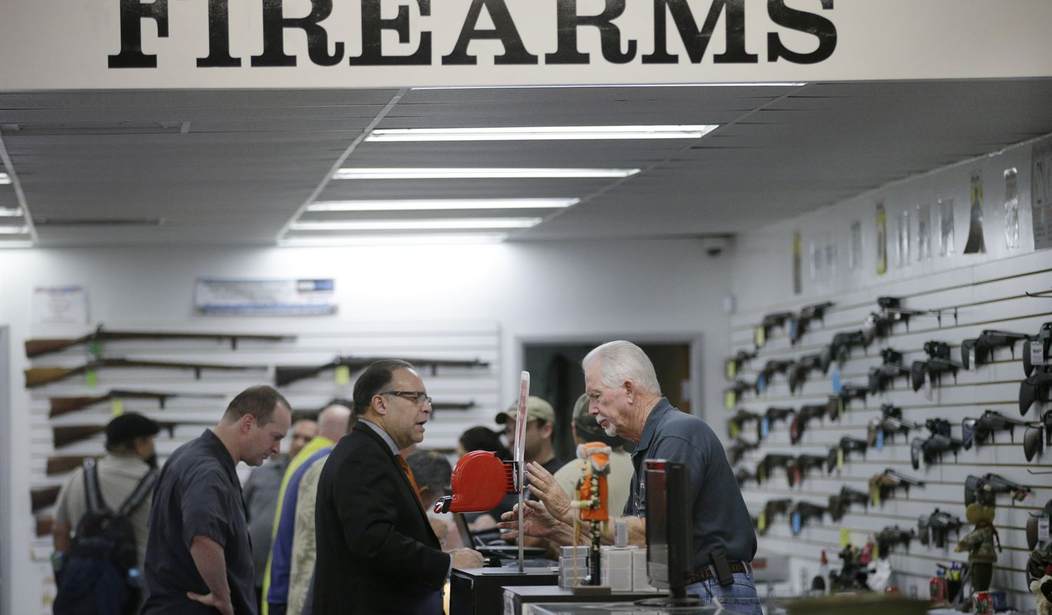As my colleague Tom Knighton has been reporting, a collection of gun makers and sellers doing business in an old mill in the Massachusetts town of Littleton are under fire after a Boston Globe story revealed the unlikely existence of a Second Amendment bastion in one of the most anti-gun states in the country.
While the Globe story accused the businesses of “exploiting loopholes and gray areas in the law to sell military-style firearms and other firearms forbidden by the state,” one local official told angry residents on Wednesday evening that there’s no evidence any of the companies operating out of the former elastic mill have broken any laws.
The top town elected official, Matthew Nordhaus, insisted at a Wednesday meeting that a cluster of 80-plus gun dealers operating out of an industrial mill that were the subject of a Globe story have not been found to have committed any illegal activity — but he would not say if they had violated the attorney general’s controversial directives on the assault weapons ban.
Nordhaus, the Select Board chair, said the dealers “have met all requirements stipulated by the town,” and that the Littleton Police Department “has received no complaints of illegal, in-state sales by these dealers, nor has illegal activity been found during required inspections.”
That wasn’t enough to satisfy the most vociferous opponents of the Second Amendment who were on hand, of course. They demanded to know why so many gun-related businesses have been approved to operate inside the city limits, when officials apparently should have been trying to run them out of town instead.
Roughly 70 people attended the meeting at the public library. . Nearly everyone who spoke was adamantly against the businesses — with one woman saying she stopped sending her sons to the music school inside the building, and another suggesting that the police chief be fired for issuing permits to so many gun stores.
But several residents expressed frustration that they hadn’t received any clarity on whether the vendors had actually violated the state’s assault weapons ban.
“I don’t know what Maura Healy’s interpretation of the law is, versus what the actual interpretation of the law is,” resident Julie Seitter said. “Is this breaking the law, or is Maura Healey incorrect from her assumption about the loopholes?”
If Healey wants to go after these companies, she’s free to do so, but then of course she’ll be forced to defend her expansive interpretation of the state’s decades-old ban on so-called assault weapons in court. Back in 2019 the First Circuit Court of Appeals
upheld her interpretation that the law not only covered guns banned by name, but in essence any and all semi-automatic rifles that operate in the same manner as the banned firearms; ruling that the “compelling interest in protecting public safety” on the part of the state was enough to justify the sweeping ban.
Since then, however, the Supreme Court has said that Second Amendment cases shouldn’t be based on any sort of interest-balancing test like the one the First Circuit used. Instead, the proper test of a gun law’s constitutionality is based on the text of the Second Amendment alongside the history of how that right has been exercised and viewed, particularly at the time the Second and Fourteenth Amendments were ratified. The Court also granted cert to a case challenging Maryland’s ban on so-called assault weapons, sending the case back to lower courts for a do-over after the Fourth Circuit Court of Appeals upheld the ban by employing that interest-balancing test rejected by SCOTUS in the Bruen case.
So far Healey, who’s the Democratic candidate for governor in Massachusetts, has not used her current position as Attorney General to go after any of the companies operating out of the old mill site, even though their existence has been widely reported in local media over the past month. That could change, but even if Healey decides not to engage in a high-profile legal fight over the operation of these businesses, the anti-gun locals are still pressuring Littleton officials to give the gun companies the boot.
Immediately prior to the meeting, the Select Board held a closed executive session to discuss purchasing the 100,000-square-foot mill building, which was put on the market after the longtime owner died in April.
Nordhaus declined to go into details of the discussion during the open meeting, but told residents the purchase “is something we could do if the town wills it.”
Are town officials really willing to spend millions of dollars on piece of property just so they can evict the 80-or-so taxpaying businesses from their workspaces? That seems like an awfully expensive exercise in virtue signaling to me, not to mention a giant red warning sign to any other business owner who might be thinking about Littleton as their next location; whether in the firearms industry or not. Once the scolds realize they can run disfavored businesses out of town, I guarantee they’re not going to stop with gun companies. Who on earth would want to do business in a town where the perpetually outraged are in charge?
I don’t know how financially viable it would be, but I’d love to see the 80-plus gun-related companies that operate out of the old mill pool their resources and buy the building themselves. In order to pull that off the vast majority of them would probably need to sign on, and I’m just not sure how many of these business owners are willing and ready to stand and fight… especially with greener pastures just a few miles away and across the Massachusetts state line in southern New Hampshire. At the moment it doesn’t appear that a self-imposed exodus is imminent, but it’s also clear that the anti-gun bigots in Littleton haven’t given up on trying to run these companies out of town.








Join the conversation as a VIP Member